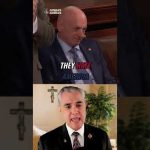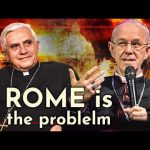After Chinese bishops left the Vatican’s synod on synodality early this week, sources in China told The Pillar that their country’s government had given the bishops only short-term exit visas from China.
The bishops actually overstayed their allotted time, choosing to remain at the synod past their mandated return date, according to senior Church sources in China.
Bishop Anthony Yao Shun and Bishop Joseph Yang Yongqiang attended the Vatican synod this month after being nominated by the pope for the meeting — the Holy See confirmed that Pope Francis had chosen the clerics from a slate of prospective invitees who were first approved by Beijing.
The synodal secretariat announced earlier this week that Yao and Yang were returning to China after taking part in the first 12 days of the nearly-month long synodal session.
Their early departure mirrors the last time bishops from the People’s Republic of China participated in a Roman synod in 2018, from which two Chinese delegates made a similarly premature exit.
The exit of the Chinese bishops this month was noted among synod watchers, some of whom noted that Chinese dioceses had not taken part in the diocesan phase of the global synodal process, and that mainland Chinese bishops had not attended the continental sessions for Asia.
But senior sources in the Church in China told The Pillar that although Yang and Yao had been invited by Pope Francis from a list of potential attendees acceptable to Beijing, both men had come in good faith to the synodal assembly, and that their early departure was always a condition imposed by Beijing.
“Chinese nationals resident in the mainland need visas to leave China,” one senior Chinese cleric told The Pillar on Oct. 17, shortly after the bishops’ departure was announced in Rome. “These visas are entirely discretionary. They are often granted at the very last minute and include a set return date.”
In the case of Yang and Yao, the source said, the exit visas were “granted for a period of time that requires their return before the synod is over, thus demonstrating — to the Vatican, in the first instance — that they attend at the pleasure of the Chinese state: that China and not the Vatican is in charge.”
But while the bishops may have attended the synod only with the Chinese government’s permission, The Pillar has learned that by remaining in Rome for as long as they did, the two bishops actually overstayed their state issued visas.
A senior source in the Church in China confirmed Oct. 19 that both bishops were only issued 10-day exit visas from the country, and chose themselves to remain in Rome for 12 days, in order to participate further in the synodal process.
The source told The Pillar that the bishops’ decision to stay past their 10 day allotment would have been unsanctioned by the government and characterized the choice as a “bold” and pointed act of independence.
Another source in China told The Pillar that Yang and Yao had “a difficult needle to thread” in their relations with Rome.
“I think a lot of people make the assumption that the Church in China is black and white,” the priest said. “There are ‘good’ underground Catholics and bishops and then there are government cooperators who are ‘bad’. Nothing is that simple.”
The priest told The Pillar that while many Catholics opted not to work with the state and suffer resultant persecution, other bishops, like Yang and Yao, “have to somehow keep their communion with Rome and work within the confines of the government’s policies. If they don’t, then you face a very different reality for the Church in China.”
“It’s not as easy as saying there’s an underground Church and a state church. The separation isn’t clear or absolute, and it runs through individuals, too — the faithful and bishops live this blend in themselves. It’s an uneasy tension, but it is the reality the Church lives.”
In the years since the 2018 Vatican-China deal, Beijing has steadily exerted formal and unilateral control over the episcopal appointment process for mainland dioceses, first by appearing to preempt Vatican approval of candidates to fill diocesan sees and then by seeming happy to dispense with Holy See involvement at all.
More recently, the Chinese government has gone much further, erecting its own dioceses, and prevailing upon bishops to abandon their legitimate assignments to take up posts recognized by the Communist Party but not the Church.
Bishop Yang Yongqiang is the 53-year-old Bishop of Zhoucun in China’s eastern Shandong province. He was ordained coadjutor bishop of the diocese in 2010 with Vatican approval and took up the leadership of the diocese in 2013.
Yang has served in senior roles in Church-state affairs in China. He was reportedly elected vice-president of the Catholic Patriotic Association in 2016 and currently served as the deputy head of the Bishops’ Conference of the Catholic Church in China — a state-sponsored group not recognized as a canonical bishops’ conference — which is responsible via the Chinese Patriotic Catholic Association for enforcing Communist Party-approved measures to “sinicize” the Church and faith.
Bishop Anthony Yao Shun is the 57-year-old leader of the Diocese of Jining in China’s Inner Mongolia Autonomous Region. He studied liturgy at Saint John’s University in Collegeville, Minnesota, in the 1990s.
After returning to China, he played prominent roles in the country’s liturgical commission, which is overseen by the state-managed Catholic Patriotic Association and the Council of Chinese Bishops, which is not recognized by the Vatican.
The Vatican reportedly approved Yao’s appointment as Bishop of Jining in 2010, but he was not ordained as bishop of the diocese until 2019, when he became the first bishop to be consecrated following the 2018 provisional agreement between China and the Holy See.















